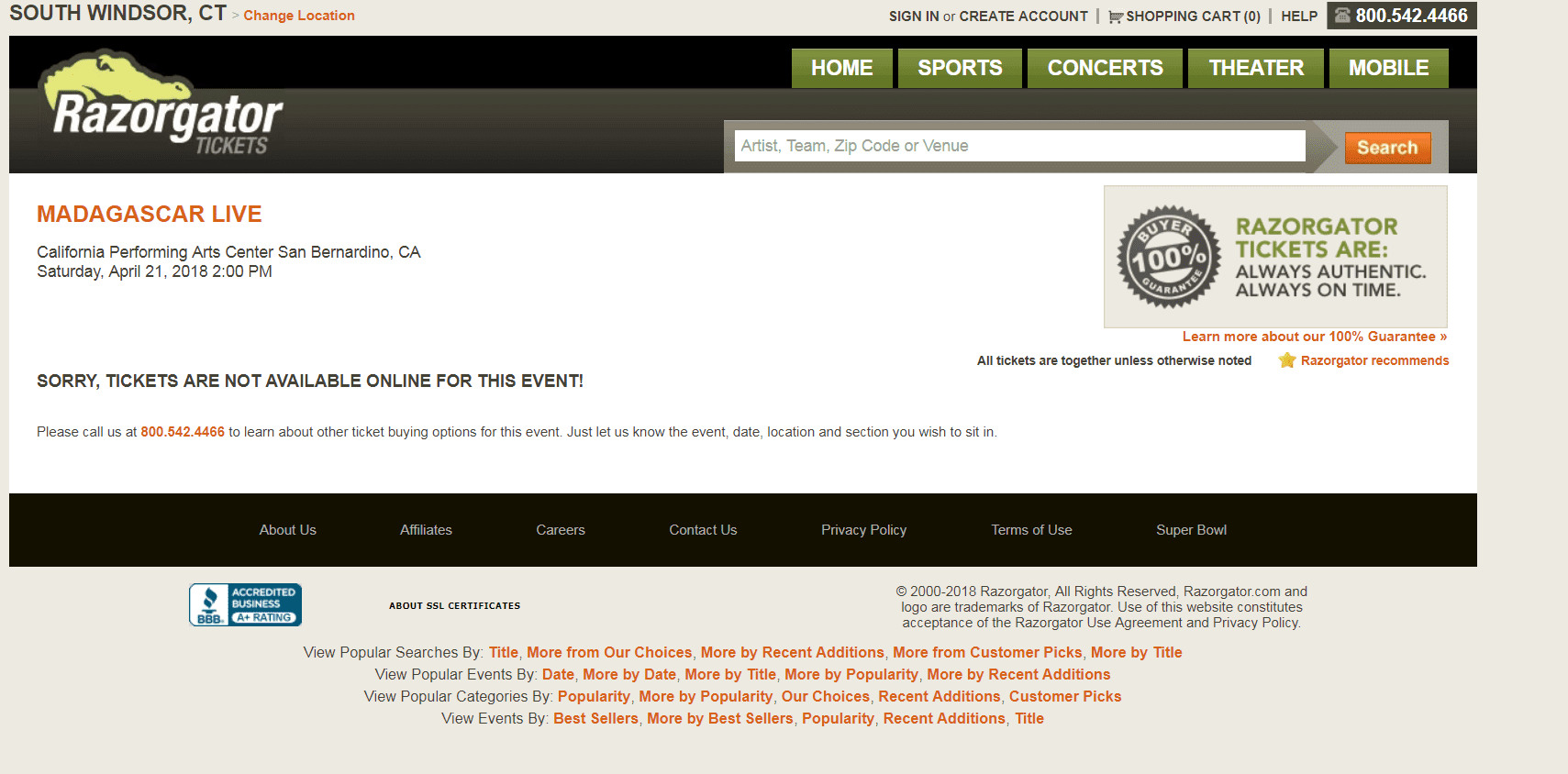Over the course of the week, news has been breaking about Razorgator going bust. Yesterday, the news was confirmed with Razorgator saying that they had entered “formal insolvency.”

If you look around the ticketing internet, you will see a lot of comparisons to ScoreBig and a lot of talk about consolidation deals, the place of smaller brokers in the ecosystem, and a bunch of other things about the state of the ticket business at this moment in history.
While everyone is likely to have a bunch of different emotions and reactions to the news that Razorgator has gone down, what does it really mean in the larger context of the world of tickets?
Here’s a few things that I think should be pointed out:
The fall of RazorGator continues to show that having a strong brand and owning a space in your market’s mind is essential to success:
Let’s play a little game here: if I were to say tickets to you, the first word that comes to mind isn’t like “RazorGator.”
If I say smart phone, I’m pretty sure the first word that pops to most people’s minds is “iPhone.”
This isn’t to try and say that RazorGator was in any way like the iPhone, but it should show you that you need to own a word in your markets mind.
In tickets, StubHub likely owns that valuable mental space and that has real implications for everyone in the industry.
The truth is that the brand of RazorGator was weak. They didn’t have a specific speciality that cut out a space in their audiences’ minds.
To me, RazorGator reminds me of Yahoo!, a business that came up in the early days of selling tickets on the internet along with StubHub and TicketsNow and TicketNetwork, while they had built a decent business, their differentiation and user experience wasn’t strong enough to separate them from everyone else.
Much like Yahoo! found when competing against Google, Bing, and other search engines.
The truth is that if you don’t own the term you need to own in your customer’s mind, you need to reframe the conversation so that you can put yourself into a situation where you are a singular focus.
Like the iPhone does.
Like Google does.
Like StubHub has done.

When you put the RazorGator collapse in the context of the ongoing consolidation movement across the secondary market, it shows that whatever is next is coming faster than people realize
Consolidation has been this buzz word in tickets for a few years now with smaller brokers complaining that consolidators are “stealing” their tickets.
I think this shows a mentality that is largely present throughout the business world right now which is that every decision can be made with data and that if I can’t figure out the data set to back up my decision, I should just stick with the status quo.
But if you look at the consolidation deals from the lens of maximizing my benefit while minimizing my risk, consolidation makes a great deal of sense for both sides of the equation.
On the primary side, why would I want to deal with 25+ different brokers when I can deal with one? Especially when their is no established relationship between the brokers and the team and no added value minus the broker buying inventory early.
On the secondary side, if you are a consolidator, why wouldn’t you use basic market forces to gain access to inventory? You can get a better deal on the inventory you purchase, you can likely get more inventory, and you can put a crimp in your competition.
As RazorGator collapses, I think this really starts to show the cracks in the foundation of what the modern ticket industry has become though: which is an industry that has too much emphasis on data and distribution.
The trend across a lot of industries is that big data would save us and in tickets that holds true.
Spend 10 minutes in any session at any ticketing conference and you will hear data used in some way to signal the next great hope no less than 5 times, I can almost guarantee it.
Going hand in hand with this, we also have this belief that our inventory has to be everywhere just in case.
This premise is faulty in any number of ways because a quick Google search will show that around the ad world, bulk ads and mass ads are less and less effective.
In tying themselves so firmly to data and distribution, we have seen this have a negative impact on the things that will drive long term growth and stability for the industry: which is attendance and interest.
My belief is that over the next 12-18 months, we will continue to see more and more consolidation and elimination of options and brokers in the industry and distribution points for tickets.
That leads to what comes next?
If you are going to just post tickets on the Internet and act as arbitrage, that business is going to get tougher and tougher.
The next big phase in both the primary and secondary markets is going to focus on customer development, customer retention, and customer service.
While revenues are still up in many measures, the glaring lack of customers actually attending games and events is pretty telling.
I’m a fan of the Peter Drucker saying, “you have one job in a business to create and keep customers.”
With declining real attendance and declining TV ratings, the revenue numbers tell us something that our eyes tell us isn’t entirely true.
Which means that sooner rather than later, the next phase of the ticket business is going to take hold.
With RazorGator’s collapse, I’d bet on the end game of this period coming sooner rather than later.
To solve this, it won’t be just a primary side solution or a secondary side solution, but an entire industry solution.
Which leads to my final point:
The way forward for the secondary market is to find ways to add value outside of just having inventory
Over the past year or so, I’ve been quietly working on an idea with some other people in the industry that would require much more of a partnership between the primary and the secondary than has ever existed before.
Liken the idea to the way that airlines work with Travelocity or the way that my local Mercedes dealer is the face of Mercedes to my family.
In both examples, the person I would buy from adds value to the transaction and the value isn’t just that they hold the inventory.
In the case of Mercedes, they offer service and maintenance, they keep me informed of new products or new offers, they offer me partnerships with other companies that they work with, on and on.
This same sort of idea is going to have to take hold in the world of entertainment and tickets, here’s a few examples where it already happens.
Take for example Pearl Jam’s summer stadium tour, the Pearl Jam fan club coordinated an offer for airline tickets for fan club members that included a discount, several hotels for people to pick from, and other offerings for their fans when they got to Seattle, Chicago, or Boston…like a loosely assembled travel planner for aging rock fans!
That adds a lot of value to people.
Or, go back to my days at Americana in NYC, we had partnerships with a number of restaurants, the American Express concierge program, the NY Athletic Club, the Marriott, and on and on. It could have been that historically, Americana had had a large percentage of its business through overall travel, but it gave us a great opportunity to work with our clients to craft unique and tailored experiences for them that they might have struggled to build on their own.
While I am not advocating everyone become a travel agent to sell tickets, I am advocating that the way to be successful in the future is going to require a rethinking of the value that you provide to the system.
Just from brainstorming sessions with ways that the secondary can create more value for the primary that will make it valuable to work with the secondary, here are 4 ideas right off the top of my head:
- Don’t just sell a ticket, but provide service in a manner that positively reflects on the buying experience.
- Work together to identify where one side can help a customer that the other side can’t. Not all customers are created equally or the same. If you are real, smart partners, it is likely that potential buyers need a really good salesperson on the primary and the secondary side.
- Share the burden of advertising and marketing. One thing that the secondary does consistently better is digital marketing, share some of that expertise and those resources to help the primary generate more awareness. That will make everyone’s inventory more valuable.
- Don’t just sell tickets, but expand your offerings to all of the things that the primary offers. Maybe a secondary partner can help sell events or catering or other ancillary items and gain a commission on the transaction.
The key here is that the only certainty is change and that if you are on the secondary side and you want to survive, you are going to have to consistently ask, “How can I add more value to the tickets ecosystem?”
The answer likely isn’t to just buy more inventory.
It is likely something else.
The truth is, I think that RazorGator’s collapse likely signals that this something else is coming sooner than we think.
Dave Wakeman is a branding and strategy expert who often opines about the ticketing world on his website and twitter. If you like this stuff and the stuff he usually posts, he does a Sunday email that talks all about value, connection, and humans. You can get that for free by sending him an email at dave@davewakeman.com




